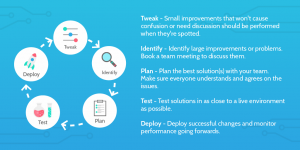If you want more revenue and results from marketing, you need to develop experimentation and optimization processes. Here’s why.
Is there a shortcut to generating revenue and results in marketing?
Marketing is complex and complicated. Many technologies, tools, and tactics promise to be an “easy button” to success.
No matter what the latest trend is, experience proves that none of them can generate endless leads, consistently boost conversion rates, or predictably increase revenue.
But what if there was a “shortcut” — a straightforward, repeatable way to generate predictable results in marketing — that we have overlooked?
After advising and coaching dozens of marketing teams of billion-dollar brands, I believe such a shortcut exists.
If you want more revenue and results from your marketing, here’s the fastest way to success.
The two drivers of revenue and results
Marketing is a complex machine with many moving pieces and parts. This brings many challenges and a misunderstanding of what drives revenue and results.
Most people think of marketing simply as a creative endeavor. After all, the visual and written components that are the cornerstone of all marketing collateral are creative work.
However, marketing is more of a process than it is a creative effort.
Does marketing require creativity? Absolutely.
But without the proper process, it becomes almost impossible to generate predictable results.
Process creates predictability — and that’s especially true in marketing
To create predictability and maximize marketing revenue and results, you need two processes: experimentation and optimization.
- Experimentation helps you find out what works (and, most importantly, what doesn’t).
- Optimization lets you get the most out of your marketing (once you know what works).
These two processes go hand-in-hand and are fundamental to marketing success. Lacking one or both will cause your efforts to be stagnant and subpar.
Unfortunately, most teams have no structure or systematic approach for either one.
Experimentation
Experimentation is about testing things to find out what works. It’s a powerful tool every marketer should leverage.
In marketing, no one really knows what will work. Not you and me — nor your team, vendors, agencies, partners, and influencers.
Even if you have an idea, it might not last long because the one constant thing in our industry is change.
Dramatic shifts in technology, competitive landscape, customer behavior, and even the culture happen every day – all of which are constantly upsetting the status quo. This volatility makes our work so exciting, yet also highly uncertain.
When you don’t have insights, you’re throwing darts with a blindfold on and hoping to hit anything. With insights, you’re standing inches from the dart board and can effortlessly hit the bullseye every time.
The best way to get insights? Experimentation.
With experimentation or testing, you apply the scientific method to uncover answers to specific questions. It can lead to get better results such as increased conversion rates, reduced cost, higher ROI, and more revenue.
That said, it’s important to realize that improved results are a byproduct of testing, not the main objectiv.
What’s essential is that it allows you to generate insights to improve all facets of your marketing through optimization.
Optimization
Optimization is the process of making continual, incremental improvements to deliver a better result with the same or fewer resources.
Want more revenue and results from your existing budget? Focus on optimization.
Just like with experimentation, you’d be crazy not to optimize your marketing. And yet, countless teams are too preoccupied with producing more content and launching more campaigns to be bothered with optimizing what they’re doing.
The benefits of optimization are apparent (who doesn’t want more from less), but it’s not as easy to do as it may sound. There are many moving pieces, and it requires building an optimization program to coordinate the efforts and the team to succeed.
First, optimization requires insights. You have to know there’s an opportunity to improve. Otherwise, you’re wasting your time.
Benchmarks are the starting point of most teams but realize that almost everything your team is doing can be improved.
Focus your optimization efforts on the areas that:
- Will have the highest impact (e.g., where you spend the most money).
- Are attainable (e.g., your team can actually execute).
Other times, knowing what to optimize isn’t quite as clear, like when a new landing page isn’t driving as many conversions as other, similar landing pages. What optimization should you make then?
This is why optimization and experimentation are inextricably linked. Use experimentation to develop and test your ideas to find what works and what doesn’t, then apply optimization to make the improvements across all of your marketing initiatives.
Once you know there’s an opportunity to improve, you have to make the changes.
Sometimes this is easy and simple, like turning off the underperforming ads. That’s fairly obvious, yet marketing teams routinely overlook such simple optimizations.
Additionally, consider applying optimizations globally. If you developed new messaging for your email marketing that produced an increased response, don’t stop there. Apply that messaging to your social content, landing pages, and paid ads.
Finding opportunities to leverage optimizations across your marketing is key to maximizing your results and the impact of your efforts.
Optimization is more involved than experimentation because it engages most of your marketing team. It requires coordination, collaboration, and communication to ensure that the necessary changes are made timely and their impact is measured correctly.
If you’re not optimizing your marketing, you’re wasting your budget and missing out on opportunities. Work smarter, not harder and invest in optimization.
Conclusion
How many experiments are you running every month? How much time and resources do you spend on optimizing your marketing versus creating and launching new efforts?
Both experimentation and optimization are essential. Each requires structure, diligence, and effort to execute consistently and effectively. Most importantly, they must be ongoing if you want to maximize the impact of your marketing efforts.
The most successful marketing teams invest in developing experimentation and optimization processes.
Because the more you experiment and optimize, the more revenue and results your marketing will produce.
The post The only two things that matter in marketing appeared first on MarTech.
MarTech(21)






